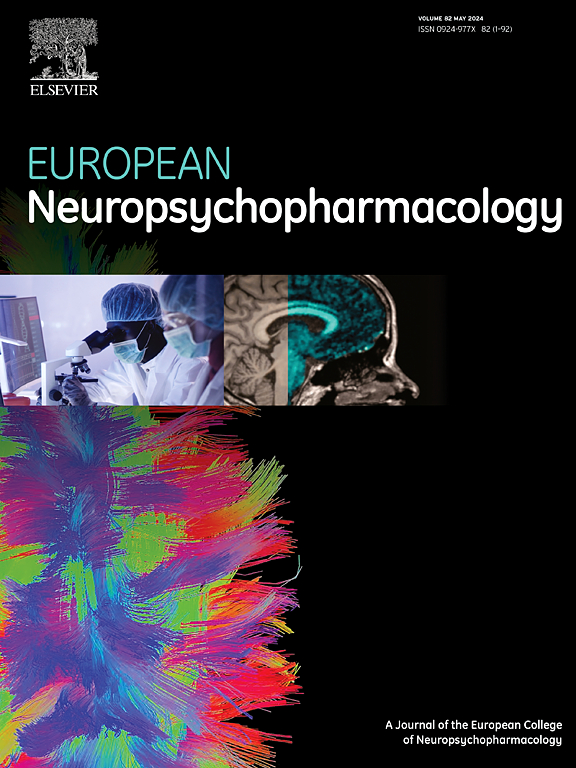Excess mortality and life-years lost in people diagnosed with depression: A 20-year population-based cohort study of 126,573 depressed individuals followed for 1,139,073 persons-years
IF 6.1
2区 医学
Q1 CLINICAL NEUROLOGY
引用次数: 0
Abstract
Depression is associated with premature mortality, but evidence is mainly derived from Western countries. Very limited research has evaluated shortened lifespan in depression using life-years-lost (LYLs), a recently developed mortality metric taking into account the illness onset for life expectancy estimation. Temporal trends of differential mortality gap are understudied. This population-based cohort study, which utilized a territory-wide medical-record database of public inpatient and outpatient healthcare services in Hong Kong, evaluated the extent of premature mortality in 126,573 individuals with depression (persons-years=1,139,073) between January 2002 and December 2021 regarding the standardized mortality ratio (SMR) and excess LYLs. Trends in annual SMRs over 20 years were assessed by joinpoint analyses. The results showed that individuals with depression exhibited significantly higher all-cause (SMR=1.84 [95% CI=1.82–1.88]), natural-cause (1.69 [1.66–1.72]), and unnatural-cause (5.24 [4.97–5.51]) mortality rates than the general population. Suicide-specific SMR was markedly elevated (7.92 [7.47–8.38]), particularly in the 15–34 year-olds (12.75 [10.87–14.79]). Respiratory diseases, cardiovascular diseases and cancers accounted for the majority of deaths. Excess LYLs extended to men (5.67 years, 95% CI = 5.45–5.90) and women (4.06 years, 95% CI = 3.89–4.23). Overall and natural-cause mortality rates improved over time, but unnatural-cause and suicide-related mortality gaps persisted. Taken together, this study indicates that depression is associated with increased premature mortality and reduced lifespan in a predominantly Chinese population, mainly attributed to natural causes. Relative suicide-specific mortality is substantially elevated, especially among young people. The pronounced mortality gap underscores an urgent need for effective interventions targeting improved physical health and suicide risk reduction in individuals with depression.
被诊断为抑郁症患者的超额死亡率和寿命损失:对 126,573 名抑郁症患者进行了长达 20 年、共 1,139,073 人年的人群队列研究。
抑郁症与过早死亡有关,但证据主要来自西方国家。使用寿命损失年数(LYLs)对抑郁症导致的寿命缩短进行评估的研究非常有限,而寿命损失年数是最近开发的一种死亡率指标,在估算预期寿命时考虑了疾病的发病时间。对不同死亡率差距的时间趋势研究不足。这项以人群为基础的队列研究利用香港公共住院和门诊医疗服务的全港医疗记录数据库,评估了2002年1月至2021年12月期间126,573名抑郁症患者(人年=1,139,073)的过早死亡程度,涉及标准化死亡率(SMR)和超额LYLs。通过连接点分析评估了 20 年间每年 SMR 的趋势。结果显示,抑郁症患者的全因死亡率(SMR=1.84 [95% CI=1.82-1.88])、自然原因死亡率(1.69 [1.66-1.72])和非自然原因死亡率(5.24 [4.97-5.51])明显高于普通人群。自杀的具体 SMR 明显升高(7.92 [7.47-8.38]),特别是在 15-34 岁的人群中(12.75 [10.87-14.79])。死亡原因主要是呼吸系统疾病、心血管疾病和癌症。男性(5.67 岁,95% CI = 5.45-5.90)和女性(4.06 岁,95% CI = 3.89-4.23)的长寿年限过长。随着时间的推移,总死亡率和自然原因死亡率有所改善,但非自然原因死亡率和自杀相关死亡率的差距依然存在。综上所述,本研究表明,在以中国人为主的人群中,抑郁症与过早死亡率增加和寿命缩短有关,主要归因于自然原因。自杀导致的死亡率相对较高,尤其是在年轻人中。明显的死亡率差距突出表明,迫切需要采取有效干预措施,改善抑郁症患者的身体健康并降低自杀风险。
本文章由计算机程序翻译,如有差异,请以英文原文为准。
求助全文
约1分钟内获得全文
求助全文
来源期刊

European Neuropsychopharmacology
医学-精神病学
CiteScore
10.30
自引率
5.40%
发文量
730
审稿时长
41 days
期刊介绍:
European Neuropsychopharmacology is the official publication of the European College of Neuropsychopharmacology (ECNP). In accordance with the mission of the College, the journal focuses on clinical and basic science contributions that advance our understanding of brain function and human behaviour and enable translation into improved treatments and enhanced public health impact in psychiatry. Recent years have been characterized by exciting advances in basic knowledge and available experimental techniques in neuroscience and genomics. However, clinical translation of these findings has not been as rapid. The journal aims to narrow this gap by promoting findings that are expected to have a major impact on both our understanding of the biological bases of mental disorders and the development and improvement of treatments, ideally paving the way for prevention and recovery.
 求助内容:
求助内容: 应助结果提醒方式:
应助结果提醒方式:


